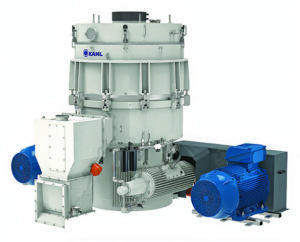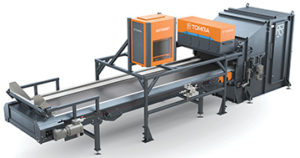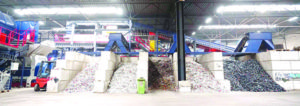ManufacturerACS Group Amandus Kahl USA Bilt-Rite Disposal Equipment Ltd. CM Shredders Eldan Recycling Granutech-Saturn Systems Herbold Meckesheim USA Hosokawa Polymer Systems International Baler Komar Industries, Inc. Maren Engineering Inc. Pallman Industries Inc. TOMRA Recycling Sorting Vecoplan, LLC
|
by MARY M. THORNTON
As environmental challenges continue around the globe, sustainable waste management, which includes plastic recycling, has become paramount for the world to adopt. In just the U.S., plastic recycling volumes increased in 2021 by 280.3 million pounds. This resulted in over five billion pounds of postconsumer plastic recycled. There is a wide range of products available for the various processes involved in this recycling sector.
Mike Curci, president, Amandus Kahl USA, explained how the company’s flat die pellet mills “represent the pinnacle of innovation and efficiency and offer a game-changing solution for the waste and chemical plastics industry. We’re a trailblazer in this field and these cutting-edge machines are equipped with top-notch features such as diverse sizes to suit varying needs and unmatched ease of use. The unique aspect lies in our product’s ability to transform waste and chemical plastics into valuable pellets, contributing to a circular economy. This process not only minimizes environmental impact, it also provides a sustainable energy source.”
Curci believes the waste and chemical plastics industries are encountering a significant transformation, and that solutions offered by Amandus Kahl are at the forefront of it all. “As regulations tighten and environmental consciousness rises, the demand for sustainable waste management solutions has soared. Amandus Kahl’s pellet mills align perfectly with these trends, empowering companies to adapt to a greener approach and comply with evolving industry regulations. We keep a keen eye on advancements in palletization and continually enhance the efficiency and performance of our products. Our dedication to research and development benefits our clients with real time technological expertise. Our company proudly serves diverse markets and we invite potential clients to test their materials in our highly versatile pellet lab. We’re confident we’ll provide tailored solutions for each client’s unique requirements. Our flat die pellet mills are a transformative solution for the waste and chemical plastics industries, because we focus on innovation, seamless user experience, and adaptability to industry trends. Amandus Kahl is the partner of choice for businesses seeking to embrace sustainability and make a positive impact on our planet.”
The evolution of TOMRA’s new generation AUTOSORT™ boasts a wide range of standard and optional sorting technologies that create “a highly flexible and accurate optical sorting system to meets the needs of plastics recyclers, both today and in the future. TOMRA’s FLYING BEAM™ near-infrared (NIR) sensing technology offers improved light efficiency, flexible installation and improved material detection. Standard SHARP EYE™ technology increases light efficiency, while maintaining the same energy consumption to enhance sorting sharpness and improve the separation of difficult-to-target fractions,” stated Eric Olsson, Area Segment Manager Plastic for TOMRA Recycling Sorting.
The AUTOSORT Intelligent Object Recognition (IOR) software combines with these advanced technologies to make it possible to separate single polymer types, such as polyethylene terephthalate (PET), polypropylene (PP) and polystyrene (PS) at high throughput rates. The product detects material types by chemical composition, shape and color that many other technologies cannot see. Using SHARP EYE, the base AUTOSORT distinguishes the small differences between PET bottles and PET trays thermoformed, so they can be separated for equivalent product recycling.
The compact and flexible AUTOSORT helps solve feedstock supply and quality demands for plastic packaging sorting – including polyolefin and PET materials, via the product’s NIR technology, which detects resin chemical composition. So, AUTOSORT offers a deeper level of detection and sorting of polyethylene (PE) and PP by polymer than other sorting methods offered in the market. Combined with SHARP EYE, the standard unit also allows separation by color types, enabling new value streams for recyclers.
The standard AUTOSORT unit leverages classical artificial intelligence (AI) “to deliver high performance in sorting accuracy of the most complex applications. TOMRA’s add-on GAIN™ technology expands the system’s capabilities through employing AI’s powerful deep learning subset to offer an even more granular polymer sorting of plastics. Compact add-on technology, DEEP LAISER™, expands the system’s sorting power by leveraging deep learning to remove contaminants like black plastic and glass from feed material, undetectable by NIR and visual spectroscopy (VIS) technologies” said Olsson.
Van Dyk designs, sells and services custom tailored, turnkey plastics reclamation facilities (PRF). The firm is also the exclusive North American source for Bollegraaf products. Alex Wolf, technical director, explained, “We select the best piece of equipment for every stage in the sorting process to maximize quality and yields. Experts in engineering turnkey sorting systems, we begin with Bollegraaf’s patented conveyor designs and then provide a variety of screening technologies, which all have their best use case in different stages of the system design. With AI powered optical sorters, polymers can be sorted at highest efficiencies. Air separators protect downstream equipment and allow for a finer separation of plastic commodities. With extensive knowledge about various wash line technologies, Van Dyk can also take the wash line portion under its umbrella delivering a complete turnkey solution from bale to finished flake or pellet.”
Depending on the type of polymer that is targeted, there can be a very strong focus on upstream processing. Good cleanup of the material that often ends up being washed and extruded downstream ensures high yields and low operating costs. PET recycling requires a more detailed cleanup in the PRF stage, to shape the final flake down to parts per million (PPM) quality levels. Flake sorting, also by polymer, plays an important role in PET PRFs. Wolf noted a strong trend in plastic film recycling and how during chemical recycling of polymers and various chemical recycling processes, there are often different requirements on their treatment, upstream.
“Service becomes very important once a PRF is up and running. That is why Van Dyk has built an extensive service network of over 36 factory trained technicians, a parts warehouse stocking $25.3 million in spare parts, and a Van Dyk University program to train our customers on equipment operation and maintenance,” Wolf concluded.
Published in the September 2023 Edition of American Recycler News











